

AASL Position Statement Instructional Role. AASL Position Statement RoleinReading 2020 01 25. Common Beliefs. The Nonnegotiable Role of School Librarians. What principals know and think about school libraries we have learned largely from our own past experiences and school librarians.
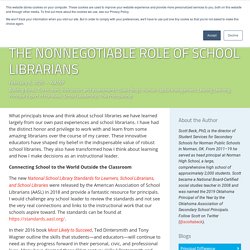
I have had the distinct honor and privilege to work with and learn from some amazing librarians over the course of my career. These innovative educators have shaped my belief in the indispensable value of robust school libraries. They also have transformed how I think about learning and how I make decisions as an instructional leader. Connecting School to the World Outside the Classroom. Online Story Time & Coronavirus: It’s Fair Use, Folks. As your library moves many of its services online in response to the coronavirus pandemic, you may be wondering about the legality of posting recorded story times to your Facebook or YouTube page.
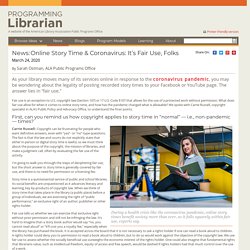
The answer lies in “fair use.” Fair use is an exception to U.S. copyright law (Section 107) or 17 U.S. Code §107 that allows for the use of a protected work without permission. Toolkit for Promoting School Library Programs. Messages, Ideas, and Strategies for Communicating the Value of School Library Programs and School Librarians in the 21st Century This toolkit includes strategies, practical tips and tools, key messages, inspirational stories, and much more to help school librarians promote the many ways they transform teaching and learning within schools, districts, and communities through their library programs.
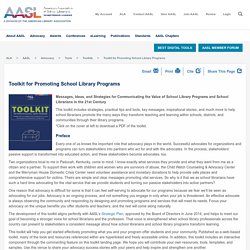
*Click on the cover at left to download a PDF of the toolkit. Preface Every one of us knows the important role that advocacy plays in the world. Intellectual Freedom: Issues and Resources. A commitment to intellectual freedom transforms your library.
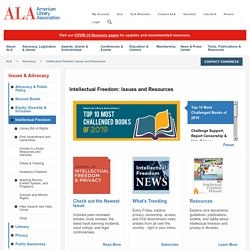
ALA actively advocates and educates in defense of intellectual freedom—the rights of library users to read, seek information, and speak freely as guaranteed by the First Amendment. Intellectual freedom is a core value of the library profession, and a basic right in our democratic society. ALA AASL CAEP School Librarian Preparation Standards 2019 Final. Position Statements. Skip to main content Position Statements.
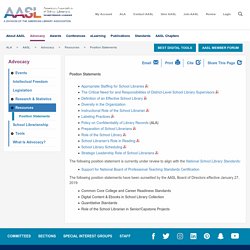
180828 aasl standards crosswalk iste. ALA/AASL Policies and Position Statements. School Libraries Transform Learning. This digital magazine produced by AASL in partnership with American Libraries, is designed to be shared with parents, colleagues, administration, and policymakers.
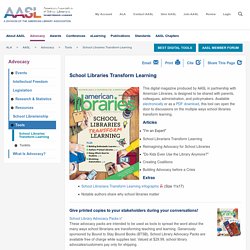
Available electronically or as a PDF download, this tool can open the door to discussions on the multiple ways school libraries transform learning. Articles "I'm an Expert" School Librarians Transform Learning Reimagining Advocacy for School Libraries "Do Kids Even Use the Library Anymore? " Creating Coalitions Building Advocacy before a Crisis. FR Librarians Factsheet. The Freedom to Read Statement. The freedom to read is essential to our democracy.
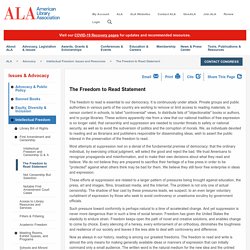
It is continuously under attack. Advocacy, Legislation & Issues. The American Library Association affirms that all libraries are forums for information and ideas, and that the following basic policies should guide their services.
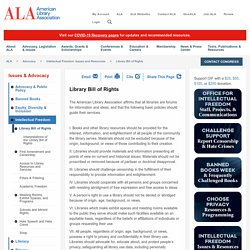
I. Books and other library resources should be provided for the interest, information, and enlightenment of all people of the community the library serves. Materials should not be excluded because of the origin, background, or views of those contributing to their creation. II. Advocacy, Legislation & Issues. Our founders recognized that public schools are a vital institution of American democracy.
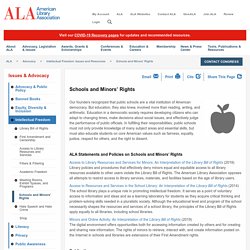
But education, they also knew, involved more than reading, writing, and arithmetic. Education in a democratic society requires developing citizens who can adapt to changing times, make decisions about social issues, and effectively judge the performance of public officials. In fulfilling their responsibilities, public schools must not only provide knowledge of many subject areas and essential skills, but must also educate students on core American values such as fairness, equality, justice, respect for others, and the right to dissent. Association for Library Service to Children (ALSC) Edited by Linda Braun, LEO: Librarians & Educators Online.
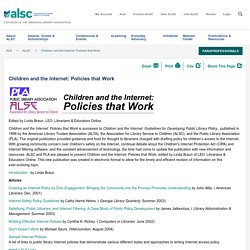
School Librarians as Learning Leaders. 2016-2017 AASL president Audrey Church’s presidential initiative focused on furthering administrators’ understanding of the key role that strong school libraries and certified school librarians play in student learning. Members of the Presidential Initiative Task Force curated selected quality resources that demonstrate the important instructional role of librarians in 21st century schools. Advocacy, Legislation & Issues. Copyright tools can help libraries and others to be more comfortable with their work to interpret the limitations and exceptions to the exclusive rights granted to the copyright holder under U.S. Copyright law. Selection & Reconsideration Policy Toolkit for Public, School, & Academic Libraries.
"The library is a growing organism" S.R. Ranganathan (1931) Home | IntroductionWhy Do I Need a Policy? Every Student Succeeds Act (ESSA) En Español Update: ESSA Consolidated State Plans A New Education Law The Every Student Succeeds Act (ESSA) was signed by President Obama on December 10, 2015, and represents good news for our nation’s schools. This bipartisan measure reauthorizes the 50-year-old Elementary and Secondary Education Act (ESEA), the nation’s national education law and longstanding commitment to equal opportunity for all students. The new law builds on key areas of progress in recent years, made possible by the efforts of educators, communities, parents, and students across the country. For example, today, high school graduation rates are at all-time highs.
Children's Internet Protection Act (CIPA) The Children's Internet Protection Act (CIPA) was enacted by Congress in 2000 to address concerns about children's access to obscene or harmful content over the Internet. CIPA imposes certain requirements on schools or libraries that receive discounts for Internet access or internal connections through the E-rate program – a program that makes certain communications services and products more affordable for eligible schools and libraries. In early 2001, the FCC issued rules implementing CIPA and provided updates to those rules in 2011. What CIPA requires Schools and libraries subject to CIPA may not receive the discounts offered by the E-rate program unless they certify that they have an Internet safety policy that includes technology protection measures.
The protection measures must block or filter Internet access to pictures that are: (a) obscene; (b) child pornography; or (c) harmful to minors (for computers that are accessed by minors). Printable Version. Children's Online Privacy Protection Rule ("COPPA") Family Educational Rights and Privacy Act (FERPA) The Family Educational Rights and Privacy Act (FERPA) (20 U.S.C. § 1232g; 34 CFR Part 99) is a Federal law that protects the privacy of student education records. The law applies to all schools that receive funds under an applicable program of the U.S. Department of Education. FERPA gives parents certain rights with respect to their children's education records.